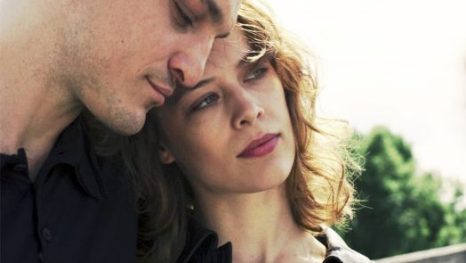
 A tragic love story with echoes from a German fairy tale shows director Christian Petzold exploring the heavy influence of the past on relationships in the present.
A tragic love story with echoes from a German fairy tale shows director Christian Petzold exploring the heavy influence of the past on relationships in the present.
German writer-director Christian Petzold has become, for me, one of those filmmakers that whatever movie he makes, I’m going to see it. He is consistently daring in his narrative and stylistic choices, exploring ideas about society, relationships, and the tortured history of modern Germany. He never settles for a simple message or a story giving you expected results, and so it requires openness and attention on the part of the viewer in order to fully experience the meanings of his films. His latest is called Undine, and unlike his last few pictures, it is set in the present.
Paula Beer, who seems to be the biggest young star in German movies right now, plays Undine, a young woman who is an historian of urban planning, and works at the Berlin Tourist center making presentations about the city’s architectural history. The idea of a city as a repository in which events of the past influence how we live and feel today is an important one for Petzold, who is especially attuned to the special atmosphere of Berlin. The film gets into this more closely as Undine does a lecture on the Humboldt Forum, a museum recently built within the structure of the 18th century Berlin Palace, the home of Prussian and German monarchs. Eventually we see that this symbolizes the story told in this film—new people and events echoing much older ones.
We see the beautiful Undine having coffee with her boyfriend. He’s breaking up with her because he’s in love with someone else. She tells him that he can’t do that because then she will have to kill him. This is a startling thing to say, but the boyfriend acts like he’s used to this kind of thing from her. Her passionate romantic obsession reminds me of heroines from the literature of previous centuries. She’s a professional, so you might think she’d be above all this, but no. This is a jealous woman who refuses to let go. She tells the boyfriend he must see her again at the café at a certain time.
Later, when she shows up at the café and goes inside, her eyes are drawn to a large ornate aquarium and the figure of a toy deep sea diver that is in there among all the fish. Then a young man who had attended her presentation that day comes in wanting to talk to her, but he awkwardly stumbles, with the disastrous effect of knocking the entire aquarium down and drenching them both. This poetic and surreal sequence is when Undine first meets Christoph, played by Franz Rogowski. Rather than being angry at him for the accident, her attraction is immediate. And so the old boyfriend is forgotten, and Christoph and Undine become an item. Here the film’s apparent sense of reality gets trumped by symbolism. It turns out that Christoph is a professional underwater diver. He eventually takes her to where he works, and things get even stranger.
Now, non-German viewers would be forgiven for not knowing that the name Undine is from a popular 19th century German fairy tale that has been adapted since in stories and plays. It concerns a water spirit or nymph who becomes human when she is loved by a man, but must return to the water if he is unfaithful. Literal minded reviewers are describing this film as if Undine is actually a supernatural being, and this is a common error people make when they see a modern story based on myth or folklore.
But Petzold only uses the mythical element as a stylistic vehicle for his own questions and issues about romantic love. What we learn about the relationship of Undine and Christophe is that she is quickly swept off her feet, as they say, and passionately committed. But Christophe, apparently unlike the men she’s known before, is more interested in getting to know her as a person, doing things together, and taking it slow rather than jumping into bed right away. He is in a sense breaking the mold, and his innocent exuberance and childlike expressions of love entrance her, but also confuse her.
Petzold is contrasting being “in love” with love, and in showing this contrast, he is evoking tragedy. Tragic love stories aren’t attempted very often anymore. I don’t mean melodrama, or even a sad romance, but a story that makes a connection between lost love and an intuition of eternity. Petzold has done that here, with a new variation on an old myth, and Paula Beer shines as the title character, a woman who seeks something real but is also, you realize, half-mad, and a mystery to herself and others. Undine depicts the most tragic distance one could experience between two souls trying to connect.

